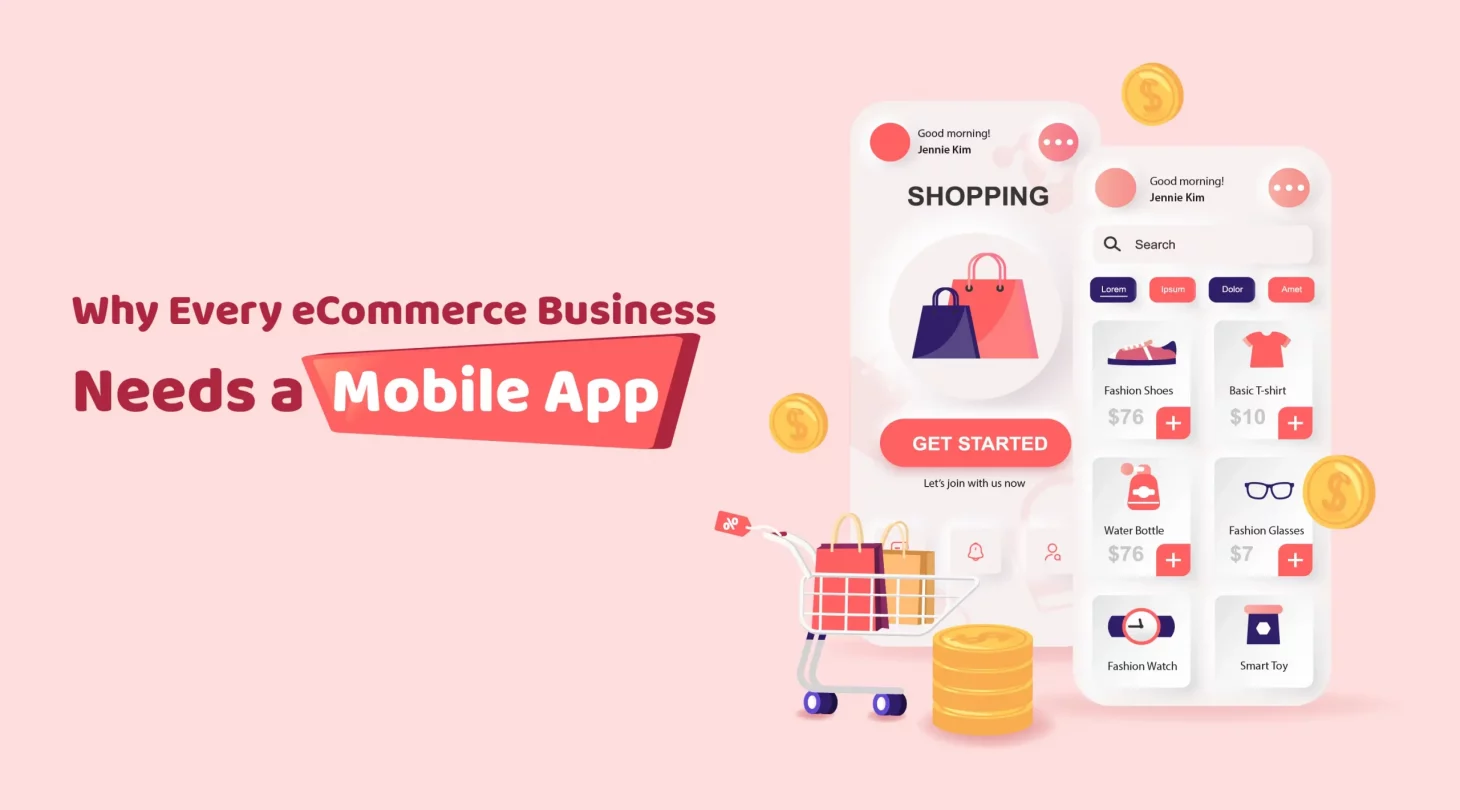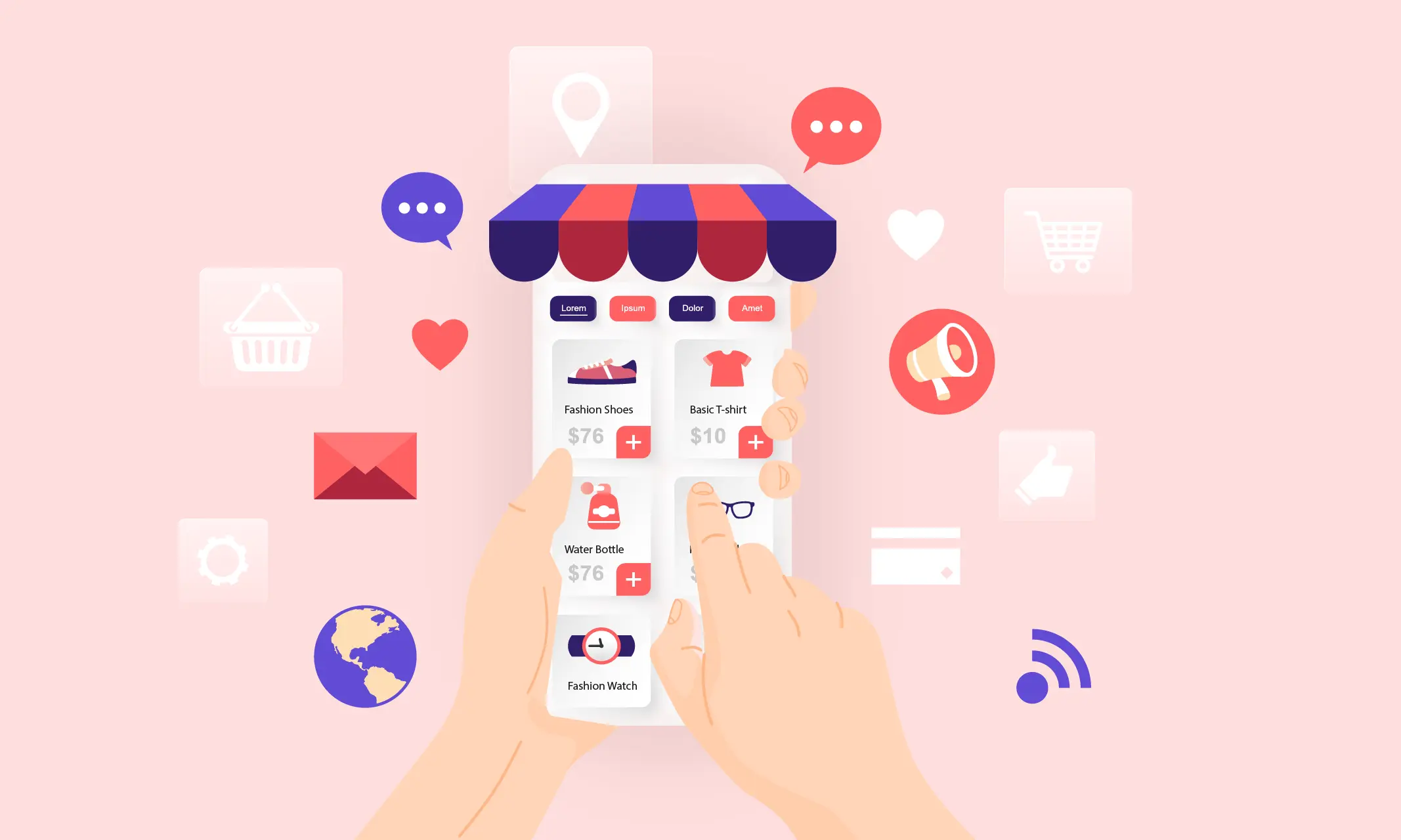Why Every eCommerce Business Needs a Mobile App
March 27, 2024

Within the upcoming competition and tech advancements, retailers are following the track with evolving trends in the tech sector and emphasizing websites and custom mobile commerce applications for e-commerce businesses. A person uses their phone for more than two hours a day on average, using both retail apps and the variety of mobile apps available. An estimated 85% of those who make purchases are predicted to have a mobile phone. This number is still rising, as seen by the 93% of individuals who continue to utilize their mobile devices for research and shopping. The improvement of e-commerce web & mobile development services is mostly driven by consumers who purchase goods and services using mobile devices. The question then becomes, “How are you going to leverage this knowledge to increase your eCommerce revenue?” The solution is simple but effective: your online store needs a mobile app.
Your eCommerce store will never be able to realize its full potential if you only rely on a website. The industry’s recent trends are unquestionably moving us closer to a future, focused primarily on mobile devices. This blog seeks to educate on how to enhance their e-commerce store’s exposure through app development and reap the benefits of mobile apps in this cutthroat environment. Now let’s get started!
A bit of life-asserting stats
At present, two main forces are pushing the trend of increasing mobile consumption. The first and most obvious is that mobile phone penetration is still increasing globally. Of the 1.14 billion tablet users globally – a considerable number – has increased by roughly 36% in the past six years. Annual app spending was on pace in 2023, generating 171 billion dollars.
Smartphone displays are gradually changing desktop computers. By December 2022, mobile traffic accounted for 61.42% of the market share, compared to 38.58% for computer traffic. Second, the COVID-19 pandemic outbreak caused consumers to shift their purchasing habits and favor internet retailers over brick-and-mortar stores. Customers flocked to internet stores during the global lockdown to make purchases. Customers spent $1.7 trillion in online stores in the United States alone during the last two years of the pandemic, which is 55% more than they did in the pre-Covid era. These numbers show that the e-commerce market is as competitive as it has always been and that it is not going to go out of style anytime soon. That should serve as a clear warning to all entrepreneurs and business owners to remain adaptable and modify their plans in response to market demands.
What is Mobile eCommerce, and Why Does Your Business Need It?

If you undervalue mobile eCommerce, your company could suffer. The growth of e-commerce in the last five to ten years has demonstrated its significance for communities embracing a larger online community.
The growing importance of mobile eCommerce
The state of growing businesses has altered due to the emergence of mobile devices and app development technology. A mobile e-commerce app is a great way to establish reliable customer connections and brand recognition. The emergence of eCommerce has already brought about a significant shift in our way of living. If customers shop from their desktop computer instead of going into a store, they may access a wider selection of products, surprisingly compare prices, and make purchases from the comfort of their homes. As a result, customers may be even happier when they use a brand whose mobile website and app enable them to make purchases quickly.
7 Key Advantages of E-commerce Mobile Applications
Improved Customer Targeting Capabilities
With the use of a certain utility, mobile applications enable users to easily gain direct access to internet retailers. Through the creation of an account, mobile applications allow users to save time. Customers won’t have to repeatedly log in and out of the website in this manner. Furthermore, mobile apps provide a quicker surfing experience than web pages. Nowadays, practically everyone owns a phone, and mobile apps offer a better and quicker shopping experience. An added benefit of mobile applications is that they increase your business’s trust.
Additionally, you get access to a wealth of important customer data. You can track user behavior to gain a deeper understanding of their purchasing patterns and place a well-informed wager about what they will ultimately purchase. These kinds of insights let you design highly targeted ads that yield guaranteed outcomes.
Improved conversion rates
A mobile app’s easier accessibility, increased desirability, and streamlined design lead to increased sales conversion rates. Comparing mobile apps to the web, it has been shown that the former provides greater and better conversion rates. Customers are encouraged to spend more time in eCommerce apps due to the option to use many fields at once. There is an increased possibility of conversion fees when users remain on your app for extended periods. Customers using a mobile app view 286% more products and add items to their shopping basket at a whopping 85% cheaper cost than they would when using a mobile browser or website.
A better user experience will encourage users to return time and time to your service. Improved user experience, easy usability, and multiple browsing fields are the factors that contribute to higher conversion rates. It also provides access to a larger pool of potential customers, guaranteeing long-term growth. Since more conversions equate to more revenue, mobile shopping apps serve as drivers for expanding conversion charges.
Improved Customer Loyalty
Mobile apps for e-commerce can help increase consumer loyalty by offering a more personalized purchasing experience. By using analytics and data, you may customize offers, promotions, and product recommendations for individual customers. This might lead to increased client satisfaction and recurring business.
Provide a personalized shopping experience
Consumer expectations have increased; according to 91% of consumers, producers who provide relevant offers and instructions are preferred. E-commerce companies aim to gather valuable audience information and develop cell app capabilities to offer a personalized buying experience. Marketing campaigns, push notifications, cart abandonment emails, and product recommendations can all be tailored with these analytics. This strategy fosters ties with clients and motivates them to return to the store. Today’s businesses require manufacturers to appeal to their human side and provide personalized content rather than just stats, which makes personalization essential.
Improved Productivity and Reduced Costs
With the assistance of portable apps, you’ll quickly develop your gathering of people and spare cash for publicizing. The biggest advantage of portable applications is that they progress communication between your staff, sellers, and clients by permitting everybody to get to the same assets and arrange the area. This allows you to react and stay educated about your items and customer behavior. You can communicate with your staff and clients immediately, which ultimately reduces your marketing and advertising costs. Also, clients can extend your social media nearness online by sharing and utilizing the social channels coordinates into your app.
Cost-effective Marketing
Apps offer a direct line of communication with clients and can serve as an affordable marketing strategy. You may notify clients about deals, new items, and exclusive promotions via push notifications, eliminating the need for costly advertising campaigns. This has the potential to boost client engagement and, eventually, sales.
Powerful Interactive Tool
Mobile e-commerce apps can save businesses a significant amount of money by giving them an affordable, interactive tool for engaging with niche markets. E-commerce applications boost customer happiness and loyalty by offering quick connectivity, a wide selection of products, and user-friendly functionality. This results in increased customer retention and repeat business.
Top eCommerce Mobile App Features for the Next 5 Years

eCommerce companies in the long term should have basic highlights that drive income and transformations. A few of the major highlights that they may include in their apps are mobile chatbots, omnichannel experiences, voice purchasing, natural language processing, social commerce, and a few charging choices.
Since voice search is fast, comfortable, and adaptable, it’s anticipated to end up a major e-commerce trend. Organizations should optimize their apps to enable customers to utilize conversational technology for making payments, tracking orders, contacting support, adding items to the cart, and completing purchases. Also, natural language processing can offer assistance groups to get their client’s behavior and inclinations, giving important data for employment related to client benefit, item improvement, and promotion.
With apps like Instagram permitting clients to check out without taking off the app, social commerce is developing in ubiquity. Within a long time, customers will discover eCommerce indeed more charming much appreciated by this choice. An omnichannel method can be endorsed by the smooth integration of influencer advertising and marketing with other channels, such as websites, portable mobile and web applications, or physical stores. Influencer showcasing and promotion can develop an organization’s target advertisement and raise brand acknowledgment.
Creating a solid brand picture, constructing consumer faith, and boosting conversion quotes all rely on regular-person involvement. Portable chatbots can boost client engagement, provide 24/7 support, and provide robotized consumer care and custom-made proposals.
Moreover, bunches need to consider the growth of many portable wallets or installment portals to their app, as portable value selections are expanding at a sudden price. Consolidating one-of-a-kind installment techniques with Paypal, Venmo, Apple Pay, Android Pay, and Google Pay makes a variety of guarantees that clients continuously have the right of entry to their purchases. To be able to create much less stressful buys for clients, wearables can also be applied to general versatile pocket exchanges.
Voice acquisition, natural language processing, social commerce, omnichannel encounters, transportable chatbots, and numerous installment techniques are components that eCommerce organizations have to have to force modifications and payments.
So, considering the above-mentioned features, functionalities, and trends for the upcoming years, it’s time to approach the top eCommerce mobile app development services for your business growth.
Conclusion
Corporations want an eCommerce mobile app in the latest digital market if they want to expand unexpectedly, enhance purchaser pride, and see a surge in profits. Terralogic presents organizations with a no-code enhancement method to convert eCommerce websites into mobile applications that are entertaining, user-pleasant, and responsive. This permits marketers to optimize the app’s capacity, except code or technical data, improving the shopping experience and hastening the growth of eCommerce. Terralogic website converter helps organizations reach their ideal levels of accomplishment.
Keep reading about
LEAVE A COMMENT
We really appreciate your interest in our ideas. Feel free to share anything that comes to your mind.
Our 16 years of achievements includes:
-
10M+
lines of codes
-
2400+
projects completed
-
900+
satisfied clients
-
16+
countries served




